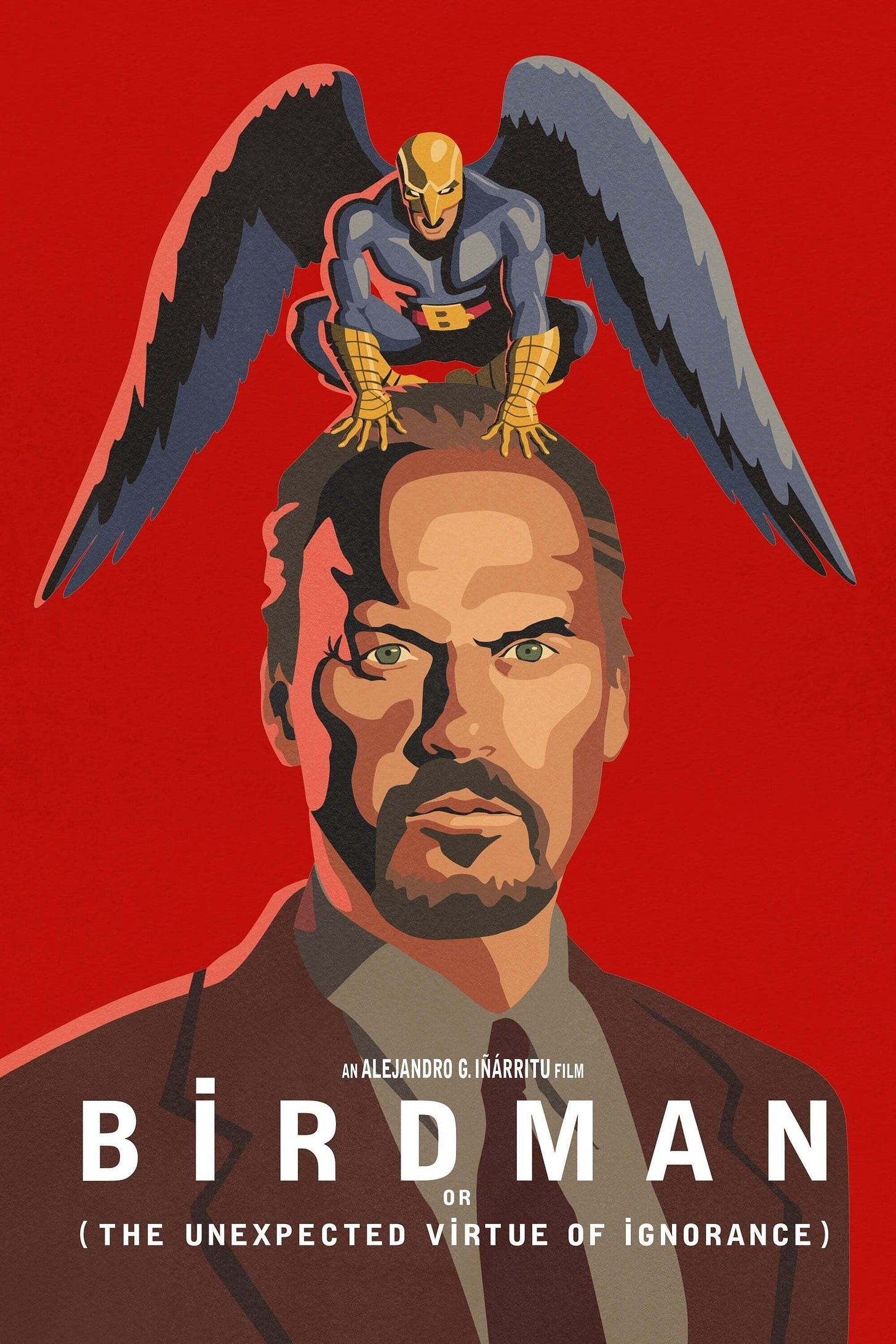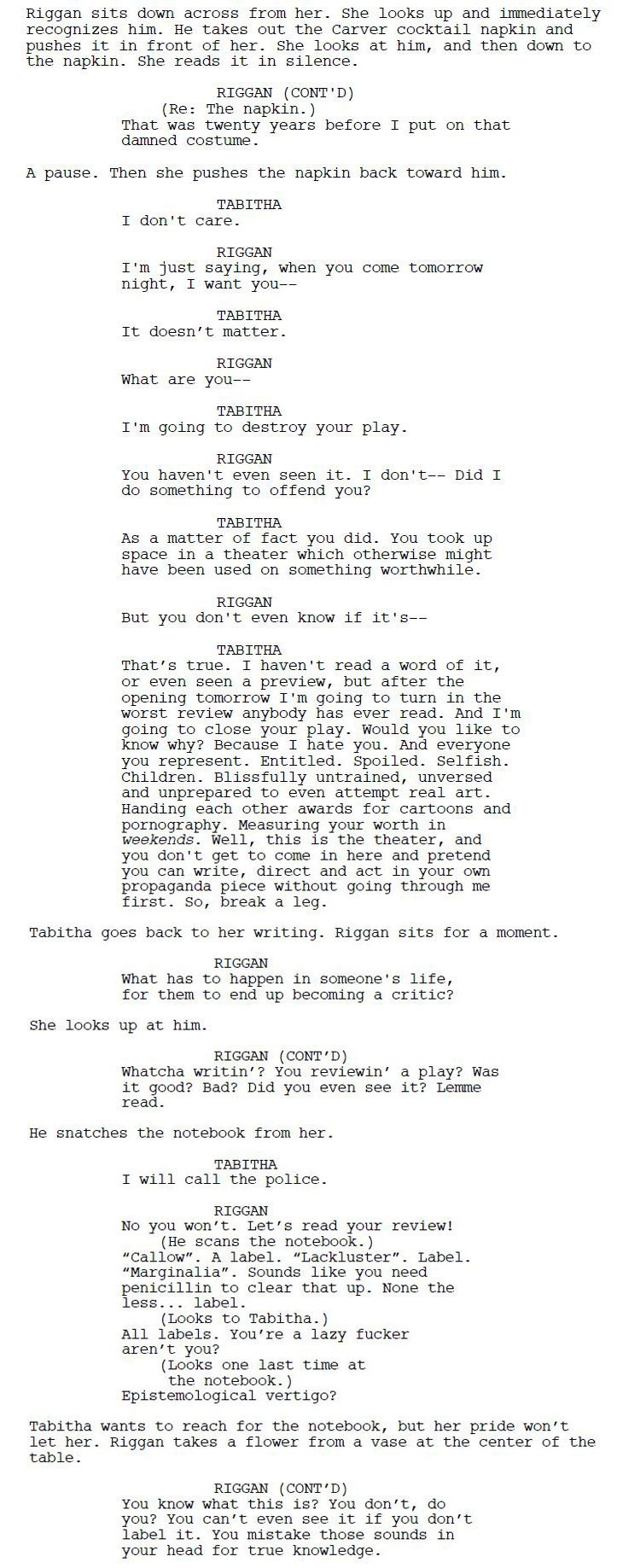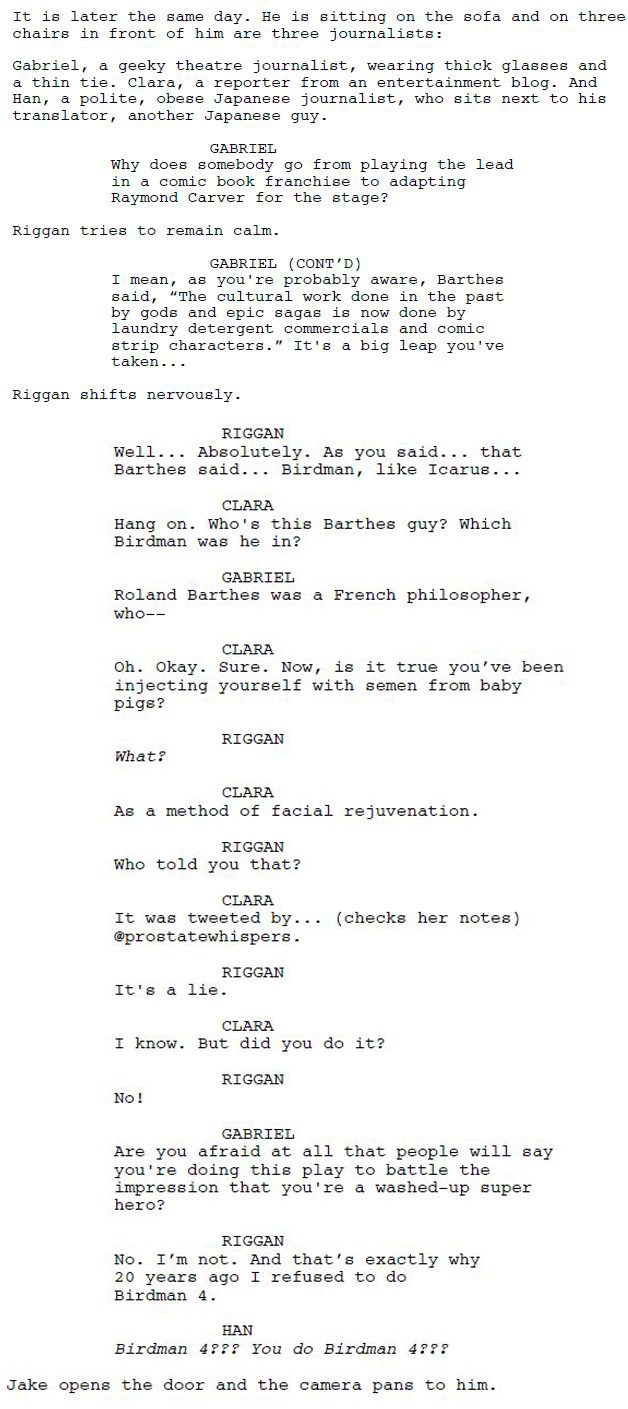Birdman (2014) Script Review | #51 WGA 101 Greatest Scripts of the 21st Century
A satire about superhero franchises, washed-up actors, Hollywood, and theater with plenty of bite and laughter.
Logline: A fading actor, best known for his portrayal of a popular superhero, attempts to stage his comeback by acting and directing a Broadway play based on a popular Raymond Carver story, but his attempts to rebuild his career while reconnecting with his estranged daughter and his friends prove more difficult than expected as opening night approaches.
Written by: Alejandro G. Iñárritu, Alexander Dinelaris, Armando Bo, and Nicolás Giacobone
Pages: 112
Scenes: 58
Characters:
Riggan Thomson (55)
Sam Thomson (21)
Mike Shiner (39)
Lesley (35)
Laura (35)
Annie (35)
Sylvia (43)
Tabitha Dickinson
Ralph (40)
Birdman: Or The Unexpected Virtue of Ignorance is an uncanny and uncomfortably prescient satire about Hollywood’s obsession— and the world’s, too– with superhero culture. The screenplay, a rare four-writer collaboration that actually strengthens instead of being a drawback, was penned just as the superhero bubble really began to blow up, and its presence lurks in every scene about this former aging superhero actor attempting to regain his fading status by recasting himself as a ‘serious’ actor.
Here's how it goes. Riggan Thomson was once a famous star thanks to his superhero role of ‘Birdman.’ But that franchise was a long time ago, and Riggan is almost a Hollywood non-entity. To return to the spotlight, he needs to do something different that will get the attention of the critics and the public. So he decides to venture into theater, because nothing says ‘serious actor’ than appearing on Broadway. But that’s not all— Riggan is also directing the play, an adaptation of Raymond Carver’s short story, ‘What We Talk About When We Talk About Love.’ There’s a lot riding on the success of the play: He’s put the last of his money into the production. If he loses, he’s out of the game.
Close to opening night, however, he’s got problems. One of the actors, Ralph, is– to put it mildly– terrible. An accident takes him out, but now they need a replacement on short notice. One of the cast members, Lesley, recommends Mike Shiner. Mike is a great theater actor and will bring the production some much needed publicity, and because he’s dating Leslie, it’ll be easier to convince him. The trouble is… well, Mike is trouble. His dedication to the craft can lead to friction. At the first preview, Mike publicly gets irritated when Riggan swaps a real bottle of gin for a prop. Then Riggan gets jealous when a New York Times article devotes most of its attention to Mike instead of the play, or Riggan, for that matter. Then at the second preview, there’s an incident when Mike visibly gets an erection during a scene. Mike is a good actor. A great actor, in fact, and he challenges Riggan to rise to his level. But yeah, his presence creates plenty of conflict.
(And for any story, that is a goldmine!)
Riggan’s troubles don’t start and end with Mike, though. His girlfriend, Laura, tells him that she might be pregnant. His relationship with his adult daughter, Sam, is tenuous at best, especially as she’s just checked out of rehab. The previews aren’t giving him much hope for the return he was holding out for, and that’s excluding the foreboding possibility that eminent theater critic, Tabitha Dickinson, might print a damning review of the play simply because she despises everything that Riggan stands for.
And throughout it all, Riggan is struggling with his own identity that has seemingly bifurcated into an alter-ego of his superhero character, Birdman. An id-like personalization, Birdman manifests from a disembodied voice into a costumed figure that taunts Riggan’s efforts to distance himself from the role that made Riggan’s name. All throughout, Riggan struggles, until the actor finally comes around to embracing the persona in Act 3, and taps into an authenticity that was not there before, electrifying the audience on opening night… right up to the moment Riggan shoots himself on stage.
Or his nose, anyway. Riggan was such a lousy shot that his failed attempt to publicly kill himself only makes his performance even grander, and wins the adulation and respect he was striving for all this time. But having secured it, is it what he wants?
Act Structure of Birdman
Act 1: page 1 – 21
Act 2: page 22 – 94
Act 3: page 95 – 112
Although the film is remembered for being shot in a single unbroken take, there is no general indication in the script that it’s meant to be captured as such. Or on occasion, it does so in small asides.
What is Birdman about?
The bigger conundrum is trying to pin down what exactly Birdman is about. A satire, for sure. A drama, but that goes without saying. But what about the moments where it seems Riggan has powers? Where he’s floating as he’s meditating, or seemingly caused the lamp that took out Ralph to fall down? Did that really happen? The surrealness is established in the opening scene itself, when Riggan is seen meditating in a Lotus position– and floating. A similar kind of ending is implied, judging by the reaction of Sam as written.
It would have been easy for the script to poke fun at superhero culture and actors trying to be taken seriously by doing theater, and to leave it at that. But Birdman hungers for more. It wants to challenge you.
The screenplay originated when Iñárritu came up with the idea of a comedy staged in a theater and filmed in a single take. He shared the idea with Giacobone and Bo, his cousins. To his relief, they— and other writer Dinelaris— did not dissuade him about the one-take approach. The four writers brought their respective experiences collectively to the script, wading through multiple drafts and collaborating from different parts of the world through Skype calls (remember Skype?), until they ended up with a script they could all agree on… one-and-a-half years later.
The resulting screenplay hangs on a solid framework. It hits the points in Act 1, 2, and 3 like a Swiss watch. While the A-plot busies itself with the issue of Riggan trying to make the play work, the B-plot tracks Riggan’s emotional and turbulent conflicts between Sam, Mike, Lesley and Laura when they are off the stage.
It is also, unexpectedly even, quite funny! Mike’s antics, and Riggan’s too, are amusing, as is the meta-humor such as Riggan reeling off a list of real actors to replace Ralph, only to learn that they are all committed to superhero franchises.
There’s also a grimly satirical bit on page 9 where Riggan attempts to give an interview to three different types of journalists: the serious pro whose points fly over Riggan’s head; the superficial one who only cares about the Birdman franchise and Riggan’s skin-care routine; and the uber-Birdman fan who gets excited at the mere mention of the franchise name.
Tellingly, it’s a depressing portrayal of media and journalistic standards today.
Is Birdman a navel-gazing piece of work? It does verge occasionally in that direction, but I find that it’s a critical story about Hollywood’s love affair with superhero fare that sounded the alarm even before anyone realized that the canary in the coal mine was dying. But when it makes fun of its subject, its tone is gently mocking, not ferocious, as if leaving it up to the reader to decide. It’s remarkably fresh, and apart from winning the Academy Award for Best Picture, it scored a bunch of awards for the writers, including the Academy Award for Best Original Screenplay (beating out Foxcatcher, Boyhood, The Grand Budapest Hotel, and Nightcrawler– the last three being included on the WGA’s list), as well as the Golden Globe in the same category. It’s a daring original story, all right. There’s nothing else to really compare it with.







